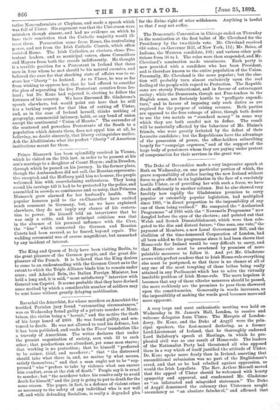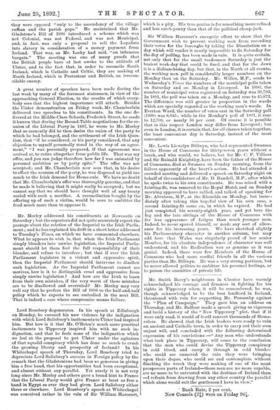A very large and most enthusiastic meeting was held on.
Wednesday in St. James's Hall, London, to receive and welcome delegates from Ulster. The Marquis of London- derry, Dr. Kane, and the Duke of Argyll were the prin- cipal speakers, the first-named declaring, as a former Lord-Lieutenant of Ireland, that he thoroughly endorse& Lord Salisbury's speech at Hastings, in which he pro- phesied civil war as one result of Home-rule. The leaders of the Nationalist Party had threatened all who opposed them in a way which of itself justified the attitude of Ulster. Dr. Kane spoke more freely than in Ireland, asserting that unconditional submission was no part of the Englishman's creed, and that as he had rebelled against oppression, so would the Irish Loyalists. The Rev. Arthur Mursell moved that the appeal of Ulster should be welcomed with hearty sympathy and approval, and condemned Mr. Gladstone as " an infatuated and misguided statesman." The Duke. of Argyll denounced the calumny that Ulstermen sought ascendancy as " an absolute falsehood," and affirmed that they were opposed "only to the ascendancy of the village ruffian and the parish pope." He maintained that Mr. Gladstone's Bill of 1886 introduced a scheme which was not Colonial, was not Federal, and was not Municipal, and, in fact, was only a proposal to sell the Loyalists into slavery in consideration of a money payment from Ireland. That was, as Mr. Lecky had said, "an infamous bargain." The meeting was one of many proofs that the British people have at last awoke to the attitude of Ulster, and to the fact that, in order to reconcile South Ireland, which is Catholic and Celtic, they are making of North Ireland, which is Protestant and British, an irrecon- cilable enemy.



































 Previous page
Previous page